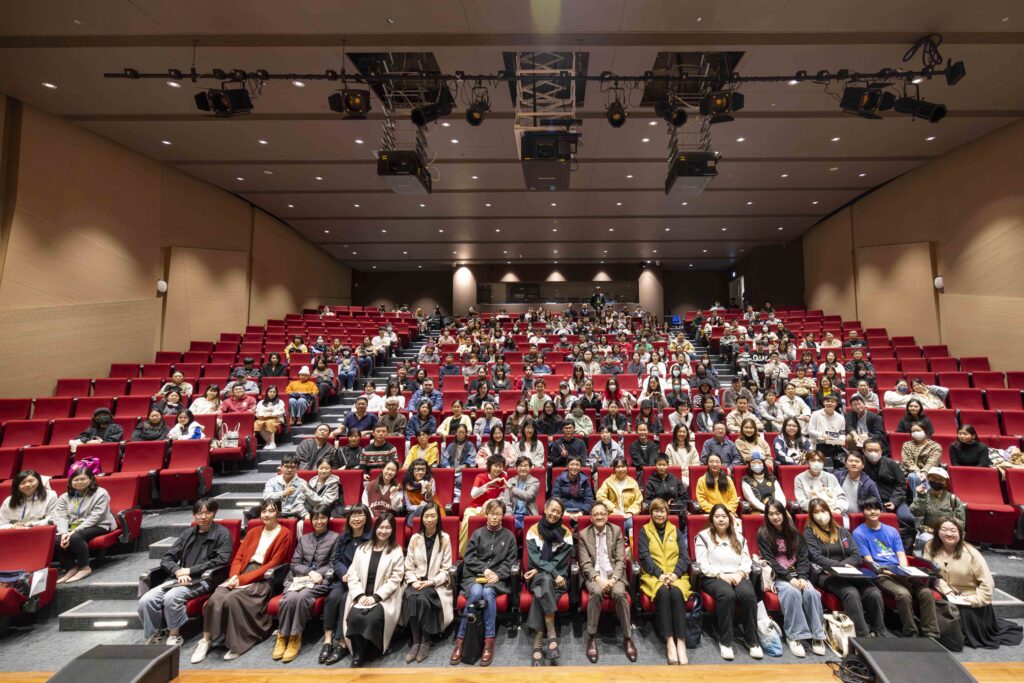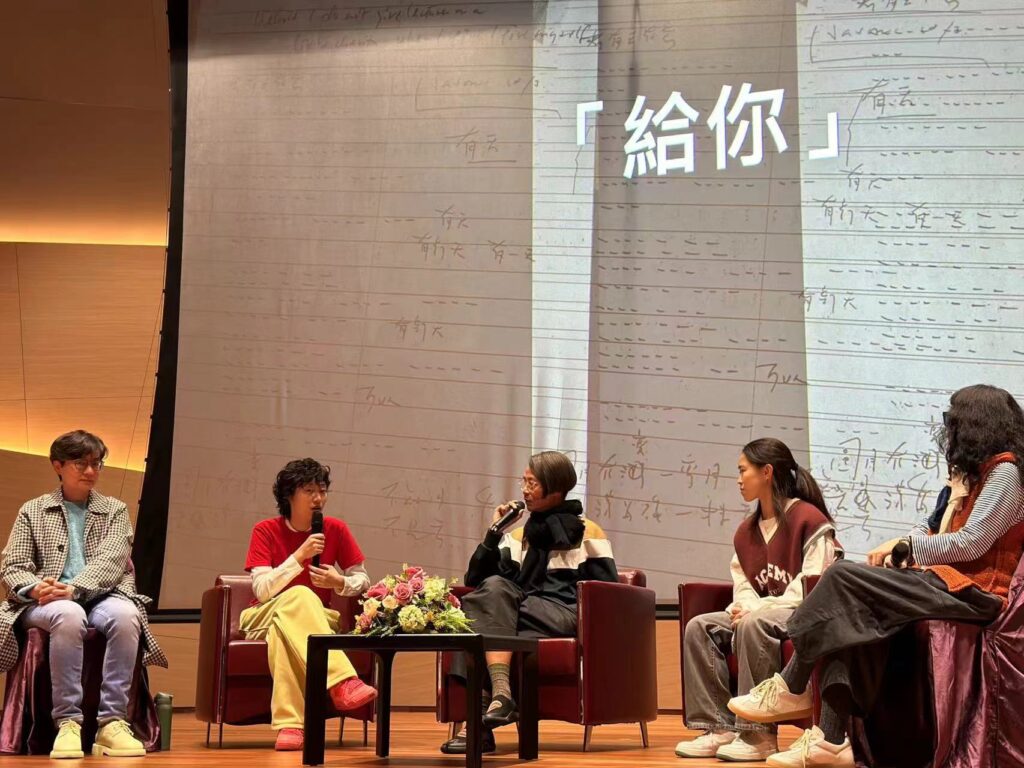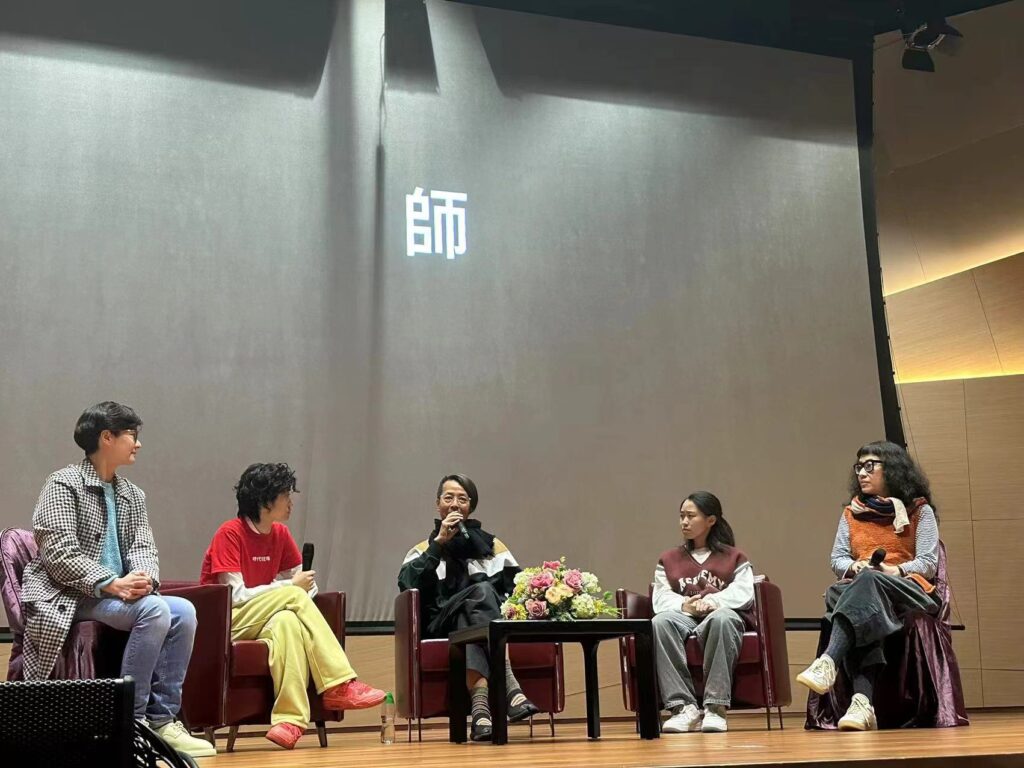圖1:都大師生x周耀輝活動合影
Photo 1: Event photo of HKMU Educators and Students x Prof. Chow Yiu Fai
本次活動是一場由學生主導的座談會,由香港都會大學人文社會科學院、田家炳中華文化中心,以及人文、語言與翻譯學系合辦。活動當天,有幸邀請到人文社會科學院院長鄺志良教授致辭。其後,座談會便交給師生代表:羅展鳳博士、葉子亭博士、陳潔潔同學及劉懿萱同學主持;分別由電影音樂及創作心路歷程兩方面探討周教授的作品。
This event was student-led and co-organized by the School of Arts and Social Sciences, the Tin Ka Ping Centre for Chinese Culture, and the Department of Humanities, Language and Translation at Hong Kong Metropolitan University. We were honored to have Prof. Charles Kwong Che-Leung, Dean of the School of Arts and Social Science, deliver the opening speech. Following his remarks, the discussion was led by representatives of both faculty members and students: Dr Law Tsin Fung Angela, Dr Penn Tsz Ting Ip, and our students Kit Kit Chan and Yixuan Liu, who respectively moderated the discussions on Prof. Chow's creative works related to film music.
羅博士教授有關電影與音樂的課程,她與潔潔同學的提問便主要圍繞填詞與電影音樂這方面。在談到近日為電影《白日之下》主題曲執筆的問題時,周教授道出了他創作的其中一種方式:以自己腦中的想像,再配合電影中的畫面去呈現整個故事的內容。在旁人眼中可能有點抽象,概括來說,就是運用了一些鏡頭語言,如特寫與蒙太奇等手法去創作,這種特別的創作方式,源於周教授童年時與母親看電影的特別經歷。
Dr Law teaches film music, and thus she and her student Kit Kit primarily focused their questions on lyric writing and film music. When discussing his recent composition for the film's theme song In Broad Daylight, Prof. Chow revealed one of his creative processes: he relies on his imagination combined with the visuals in the film to depict the story's scenes. While this approach may seem abstract to others, it essentially involves using cinematic techniques such as close-ups and montages to create art. This unique creation method stems from Prof. Chow's childhood experiences of watching movies with his mother.
對於歌詞與文學之間的關係,周教授則認為不必深究,憑心而寫就可以,當中可能記錄一下自己的過去、創傷,只要對自己有交代就行,之後就是等待知音,畢竟嚴肅文學與流行文學也不能完全的區分開來。最後,在談及歌詞班的話題時,周教授亦有一些對初學者的小建議,首先要有人脈,其次就是要主動地參與一些創作班,重於嘗試。他笑稱自己不是音樂人,不太懂樂理,在創作時也是憑著歌的旋律去填詞。
Regarding the relationship between lyrics and literature, Prof. Chow believes that there is no need for a deep analysis because it is more important to write from one's heart and intuition. It may involve documenting one's past experiences or traumas, so long as it resonates with oneself. Afterwards, it is a matter of waiting for someone who appreciates it, as classic and popular literature cannot be entirely distinguished. Lastly, when discussing his lyric-writing course, Prof. Chow offered some insightful suggestions for beginners: First, it is important to build networks, and second, to participate in creative workshops proactively, emphasizing the imperative of experimentation. He jokingly admitted that he was not a musician and did not have a strong grasp of music theory, and thus, he relied instead on the song's melody when composing lyrics.
也許社會亦會隨時間「成長」
Perhaps, the society too will “grow” with time
而葉博士的課程有關廣告寫作與創意,葉博士與懿萱同學的提問便主要圍繞「成長」與創作。談到個人成長,周教授回顧了他求學時期的點滴,感慨自己已經長大,又說道:「如果青春期過後青春便消失,隨後成為大人,其實是一件挺可悲的事。」但這不代表大人就不能繼續成長。正如他二十年前為謝霆鋒所寫的《繼續發育》一樣,人的成長會持續下去,隨著年紀一直吸收、發育。
Dr Ip teaches advertisement writing and creative work, so she and her student Yixuan's questions mainly revolved around “growth” and creativity. When discussing personal growth, Prof. Chow reflected on his days as a student, remarking on his maturation. He stated, “If youth disappear after adolescence and one simply becomes an adult, it's actually quite sad.” However, this does not mean that adults cannot continue to grow. Like his lyric “Continue to Grow,” written for Nicholas Tse twenty years ago, human growth is ongoing, with individuals continuously absorbing knowledge and developing with age.
















